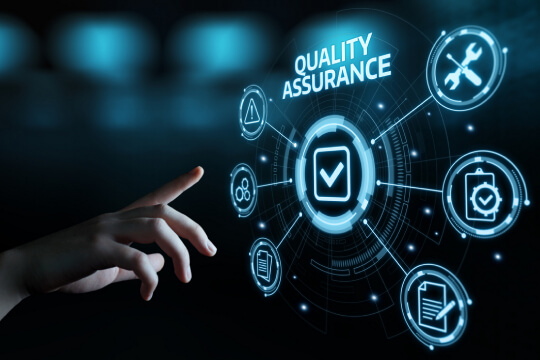Quality Assurance Calibration, its importance, and the factors affecting its frequency
Quality Assurance Calibration
Quality assurance (QA) calibration is an essential component of the call center business as it helps to ensure that customers are receiving consistent and high-quality service from the agents. By regularly conducting this process, call centers can improve their overall performance and provide better experiences for their customers.
QA calibration is all about the process and the end result. With the help of calibration, the call center expects that all the touch points for customer and agent interactions are made clear and enforceable. The procedure consists mostly of the QA team having concentrated discussions and reviewing interactions & their results.
The end result is a robust and reliable QA program that supports call center agents in doing their best work in providing top-notch customer service.
Why Quality Assurance Calibration Sessions are required?
In the call center industry, customer satisfaction is of the utmost importance, and QA calibration helps to ensure that the company’s standards for customer service are being met.
There are various reasons why QA calibration should be conducted frequently and these reasons are:
1. QA Process Integrity
Holding regular QA calibration sessions help maintain the integrity of the QA process. Without regular calibration, the evaluations performed by different members of the QA team may vary, leading to inconsistency and potential errors. By holding regular calibration sessions, the QA team can ensure that everyone is using the same criteria and standards when evaluating the quality of a product or service.
2. Open Discussions
Another benefit of regular QA calibration sessions is that they provide an opportunity for the QA team to discuss any challenges or issues they are facing. This can be particularly useful if the team is evaluating a new or complex product, or if there have been any changes to the quality standards being used. During the calibration session, the team can share their experiences and ideas, and work together to find solutions to any problems that may have arisen.
3. The quality of products and services
Regular QA calibration sessions can also help improve the overall quality of the products or services being evaluated. By ensuring that the QA team is consistently using the same criteria and standards, the evaluations performed during these sessions can help identify potential issues or areas for improvement. This information can then be used to make changes to the product or service, ultimately resulting in a higher-quality end product.
Additionally, QA calibration can help to identify any potential issues or concerns that may be impacting the customer experience.
Quality Assurance Calibration Sessions
QA calibration sessions are an important part of any quality assurance program. These sessions help ensure that all members of the QA team are on the same page when it comes to evaluating the quality of a product or service.
But how often should these calibration sessions be held?
The frequency of QA calibration sessions depends on a number of factors, including the size of the QA team, the complexity of the products or services being evaluated, and the rate at which the products or services are changing. In general, it is a good idea to hold calibration sessions at least once every quarter, or four times per year; however, it has been noticed that most call center businesses conduct QA calibration on a monthly basis. This ensures that the QA team stays up-to-date and consistent in their evaluations.
At the same time, there are multiple factors at play that influences the frequency of calibration sessions. These factors are:
1. Company’s Growth Rate
As time passes, the customer support segment of successful companies and call centers expands eventually. The growth of consumer awareness about your brand results in more inquiries for your agents. Having more customers generally results in increased revenue, so that’s a good thing. No customer support team or call center can afford to let their QA program lapse, especially as they grow. The growing company continuously attracts modifications in QA strategies and calibration processes, making it difficult to implement frequent calibration sessions.
2. Rising workload
As your customer base expands, the management team needs to hire more agents to handle the influx of inquiries the call center will undoubtedly receive. Additionally, more agents mean more work for your QA analysts. Your agents’ productivity may be impacted if they are simply unable to keep up with demand because they are in charge of monitoring and evaluating your agents’ performance.
Everyone stays focused and is reading from the same page when adjustments are made based on team size. Calibration sessions are crucial when adding new analysts to your QA team to ensure that everyone is aware of what to look for during assessments. Being well-informed may enable them to almost start from scratch, which is something they must be able to do.
3. Informing the agents about the calibration & its fairness
Everyone, including the call center agents, needs to be aware of the objectives, strategies, and procedures used in the QA calibrations. Agents are likely to be more responsive when they understand that they have access to the data obtained from monitoring their roles. This includes involving the call center agents at all levels in QA calibration sessions. Make sure that everyone is aware of what calibration is, how it affects the QA program, and the various responsibilities involved in the calibration process. Additionally, set up a regular standard calibration in keeping with the organizational plans for growth and employment.
Apart from this, the leadership team must make sure that all the call center agents are assured about the fairness of QA calibration and how calibrations are conducted i.e., without biasness.
4. QA Calibration Results
After the QA calibration is finished, analysts can readily incorporate the results into their regular responsibilities and duties. Scorecards are a quick and easy way for analysts to gauge performance because they are based on issues discovered during calibrations. Customers will get an amazing experience as the call center agents themselves will know what counts the most in their conversations. Analysts can properly assess the agents’ performance which includes the handling times, reaction times, and failure rates.
It is important to note that QA calibration sessions should not be used as a replacement for regular training and development for the QA team. While calibration sessions are focused on ensuring consistency in evaluations, training, and development, it also focuses on helping the QA team improve their skills and knowledge.
Conclusion
Regular QA calibration sessions are an important part of any quality assurance program. These sessions help maintain the integrity of the quality assurance process, provide an opportunity for the QA team to discuss challenges and issues, and can ultimately improve the overall quality of the products or services being evaluated. It is recommended to hold these sessions at least once every quarter to make sure that the workforce is at par with the customer service standards.
Request for Demo






